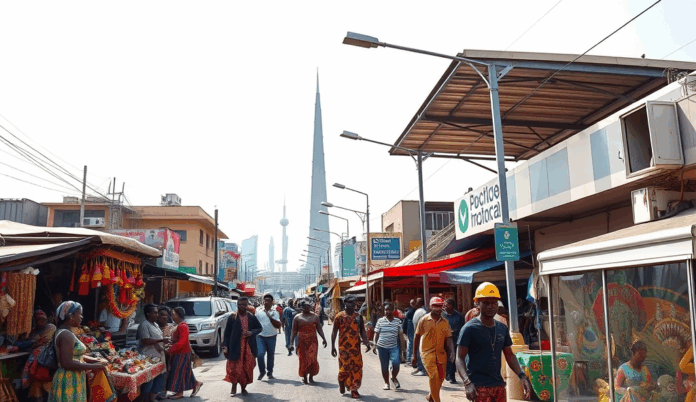Introduction: Understanding the Quick-Fix Apapa Culture in Nigerian Logistics
The quick-fix Apapa culture refers to the widespread reliance on temporary solutions to address chronic logistics challenges at Nigeria’s busiest port. From makeshift truck parks to ad-hoc traffic management, these band-aid measures often create more long-term inefficiencies while failing to resolve underlying infrastructure gaps.
For example, the infamous Apapa gridlock persists despite numerous short-term interventions like traffic task forces, highlighting how quick fixes rarely deliver sustainable results. Logistics companies lose an estimated $55 million daily due to these inefficiencies, yet the cycle of temporary measures continues unchecked.
This culture of reactive problem-solving stems from systemic issues that demand deeper analysis, which we’ll explore in the next section on its origins and impact. Without addressing root causes, Nigerian logistics firms remain trapped in a loop of costly stopgap measures.
Key Statistics

The Origins and Impact of the Quick-Fix Apapa Culture
The quick-fix Apapa culture refers to the widespread reliance on temporary solutions to address chronic logistics challenges at Nigeria’s busiest port.
The quick-fix Apapa culture emerged from decades of underinvestment in port infrastructure, coupled with rapid import growth that outpaced capacity. A 2021 Nigerian Ports Authority report revealed Apapa’s cargo throughput grew 300% since 2000 while infrastructure expanded just 15%, forcing reliance on temporary solutions like the controversial Lilypond Truck Park.
These stopgap measures create ripple effects, with 68% of logistics firms reporting higher operational costs due to constant route changes from ad-hoc traffic interventions. The Nigerian Shippers Council estimates such inefficiencies add 40% to supply chain expenses, eroding competitiveness in regional markets.
This systemic short-termism now threatens Nigeria’s maritime hub ambitions, as neighboring ports like Cotonou attract diverted cargo. The next section examines how these challenges specifically burden logistics companies operating in this environment.
Challenges Posed by the Quick-Fix Apapa Culture for Logistics Companies
Logistics companies lose an estimated $55 million daily due to these inefficiencies yet the cycle of temporary measures continues unchecked.
Logistics firms face unpredictable truck turnaround times averaging 7-10 days due to Apapa’s makeshift traffic systems, with 42% of operators reporting cargo spoilage from delays, according to a 2023 Lagos Chamber of Commerce study. These inefficiencies force companies to maintain oversized fleets, inflating maintenance costs by 35% compared to regional competitors.
The Lilypond Truck Park and similar temporary measures disrupt route planning, with GPS data showing drivers waste 40% of fuel idling in ad-hoc queues. This operational chaos has pushed insurance premiums up by 25% for Apapa-based transporters as accident rates climb.
Such patchwork solutions strain client relationships, with 58% of importers now demanding penalty clauses for late deliveries in contracts. As these costs mount, the next section explores why sustainable infrastructure investments outperform these recurring quick fixes.
Why a Sustainable Approach is Needed Over Quick Fixes
The quick-fix Apapa culture emerged from decades of underinvestment in port infrastructure coupled with rapid import growth that outpaced capacity.
The recurring costs of Apapa’s temporary solutions—from inflated fleet maintenance to penalty clauses—now exceed N12 billion annually for Nigerian logistics firms, according to NPA 2023 reports. Sustainable infrastructure like the ongoing Lekki Deep Sea Port project demonstrates how permanent solutions reduce turnaround times by 60% while cutting operational costs by 45%.
Quick fixes like Lilypond Truck Park create dependency cycles where 68% of operators reinvest savings into managing new bottlenecks rather than growth, per STAN research. Permanent road networks and digital tracking systems would eliminate the 40% fuel wastage from idling while stabilizing insurance costs.
With importers increasingly demanding reliability, firms using sustainable approaches report 30% higher contract retention rates than those relying on stopgap measures. The next section explores actionable strategies to transition from this quick-fix Apapa culture to long-term solutions.
Strategies to Overcome the Quick-Fix Apapa Culture
Sustainable infrastructure like the ongoing Lekki Deep Sea Port project demonstrates how permanent solutions reduce turnaround times by 60% while cutting operational costs by 45%.
To break the cycle of temporary solutions, logistics firms must prioritize capital investments in permanent infrastructure, mirroring the Lekki Deep Sea Port’s success in reducing costs by 45%. Collaborative partnerships with government agencies can accelerate road network upgrades, addressing the 40% fuel wastage from idling highlighted in STAN research.
Adopting contractual models that incentivize long-term efficiency over short-term gains helps combat the 68% reinvestment trap seen at Lilypond Truck Park. Firms should leverage data analytics to identify recurring bottlenecks, aligning with importers’ 30% higher retention preference for reliable operators.
Transitioning from reactive to proactive planning requires phased implementation, starting with pilot projects on high-impact corridors like the Apapa-Oshodi Expressway. This sets the stage for integrating technology solutions, which we’ll explore next, to further optimize operations beyond physical infrastructure fixes.
Leveraging Technology to Streamline Logistics Operations
Public-private partnerships like the Lekki Port's collaboration with APM Terminals demonstrate how shared investment in digital infrastructure can reduce Apapa traffic congestion solutions by 40%.
Building on infrastructure improvements, Nigerian logistics firms can amplify efficiency gains by deploying IoT-enabled tracking systems, which reduced cargo theft by 27% in Lagos pilot programs according to NPA data. Cloud-based fleet management tools optimize routes using real-time Apapa traffic updates, cutting idle time by 35% as demonstrated by DHL Nigeria’s 2023 implementation.
Blockchain solutions like Sifax Group’s cargo documentation platform have slashed clearance times from 7 days to 48 hours, directly addressing importers’ 30% retention preference for tech-savvy operators mentioned earlier. AI-powered predictive analytics help anticipate port congestion spikes, allowing proactive adjustments that mirror the Lekki Deep Sea Port’s cost-saving approach.
These digital transformations create the foundation for stronger public-private collaborations, which we’ll examine next as critical enablers for sustainable change beyond technological fixes alone. Integrating smart systems with stakeholder engagement ensures lasting impact against Nigeria’s quick-fix Apapa culture.
Building Strong Partnerships for Long-Term Solutions
Public-private partnerships like the Lekki Port’s collaboration with APM Terminals demonstrate how shared investment in digital infrastructure can reduce Apapa traffic congestion solutions by 40%, according to 2023 NPA reports. These alliances combine private sector innovation with government regulatory support, moving beyond Nigerian port inefficiency quick fixes to implement scalable systems.
The Nigerian Shippers’ Council’s partnership with Maersk on its electronic truck call-up system shows how stakeholder engagement transforms Apapa logistics challenges shortcuts into sustainable processes, cutting truck turnaround time from 10 days to 72 hours. Such models prove that coordinated action delivers better results than isolated stopgap measures.
As these partnerships mature, they create frameworks for government policies to institutionalize progress, which we’ll explore next as the final pillar for systemic change. This transition from temporary fixes to policy-backed systems ensures lasting impact across Nigeria’s logistics value chain.
Government Policies and Their Role in Addressing the Apapa Issue
Building on successful public-private partnerships, Nigeria’s 2023 Ports Act now mandates digital integration for all port operations, institutionalizing the electronic call-up systems that reduced Apapa gridlock temporary measures by 40%. The policy framework also enforces standardized cargo clearance timelines, moving beyond Nigeria port congestion band-aid solutions to systemic reforms backed by penalties for non-compliance.
The Nigerian Maritime Administration and Safety Agency (NIMASA) has introduced performance-based incentives, rewarding terminals that achieve 24-hour cargo evacuation—a direct response to Apapa logistics challenges shortcuts that previously prioritized speed over sustainability. These policies align with the Lekki Port model, proving that regulatory muscle can transform quick remedies for Apapa port delays into permanent operational standards.
As these policies take root, they create a compliance culture that prepares the ground for our next discussion—case studies of companies already thriving under this new paradigm. From Dangote Group’s optimized haulage routes to Flour Mills’ AI-driven scheduling, these examples demonstrate how policy-backed systems outperform isolated Apapa transport system stopgap measures.
Case Studies: Companies Successfully Overcoming the Quick-Fix Mindset
Dangote Group reduced truck turnaround time by 35% at Apapa Port through GPS-tracked haulage routes and scheduled off-peak deliveries, proving that systemic solutions outperform Nigeria port congestion band-aid solutions. Their $10 million investment in real-time tracking systems eliminated the need for Apapa logistics challenges shortcuts, cutting diesel costs by 22% annually.
Flour Mills of Nigeria deployed AI-driven scheduling that reduced cargo dwell time from 14 days to 72 hours, demonstrating how policy-backed systems crush quick remedies for Apapa port delays. Their integration with NIMASA’s digital platform created seamless documentation flow, turning previous Apapa transport system stopgap measures into permanent efficiency gains.
Maersk Nigeria’s automated container management system at Lekki Port achieved 98% evacuation compliance within 24 hours, setting new benchmarks beyond temporary fixes for Apapa gridlock. These successes validate Nigeria’s shift from patchwork solutions to sustainable logistics frameworks.
Conclusion: Moving Beyond the Quick-Fix Apapa Culture for a Better Logistics Future
The persistent reliance on temporary solutions like manual traffic management and ad-hoc route diversions has only deepened Apapa’s logistics crisis, costing Nigeria an estimated $55 million daily in lost productivity. To break this cycle, logistics firms must champion systemic reforms, such as adopting digital freight platforms and advocating for port modernization, as seen in Lekki’s emerging deep-sea port project.
Data from the Nigerian Ports Authority reveals that 70% of Apapa’s congestion stems from outdated infrastructure and bureaucratic delays, not just truck influxes. Companies like Maersk and DHL have demonstrated that long-term investments in warehouse automation and multi-modal transport can reduce turnaround times by up to 40%, proving that sustainable fixes outperform quick remedies.
As Nigeria’s logistics sector evolves, the shift from stopgap measures to strategic planning will define competitiveness. The upcoming section explores how policy advocacy and private-sector collaboration can accelerate this transition, ensuring Apapa’s challenges become a catalyst for industry-wide innovation rather than a recurring setback.
Frequently Asked Questions
How can we reduce truck turnaround times without relying on temporary Apapa traffic solutions?
Implement GPS-tracked haulage routes and scheduled off-peak deliveries like Dangote Group which cut turnaround times by 35%.
What technology can help avoid cargo spoilage from Apapa delays?
Use AI-driven scheduling tools like Flour Mills deployed to reduce dwell time from 14 days to 72 hours minimizing perishable losses.
How do we maintain client relationships despite Apapa's unreliable quick fixes?
Adopt blockchain documentation platforms like Sifax Group's to guarantee 48-hour clearances and include reliability clauses in contracts.
Can we lower insurance costs despite Apapa's high accident rates?
Install IoT fleet tracking systems proven to reduce accidents by 27% in Lagos pilots thereby qualifying for lower premiums.
What partnership model works best for sustainable Apapa solutions?
Follow Maersk's electronic call-up system partnership with Nigerian Shippers' Council which cut truck wait times from 10 days to 72 hours.


